By Jim Davis - Florida Catholic
Photography: JIM DAVIS | FC
COOPER CITY | The goal may be serious: training and spiritual education for people with mental and developmental disabilities. But if everything at the Schott Center has to be solemn, no one told the kids.
Not when a recent visit found them dancing to a boombox � with one of them singing Michael Jackson's "Beat It" into a karaoke microphone, and another bouncing a puppet to the music, all under the smiling supervision of seminarian volunteers.
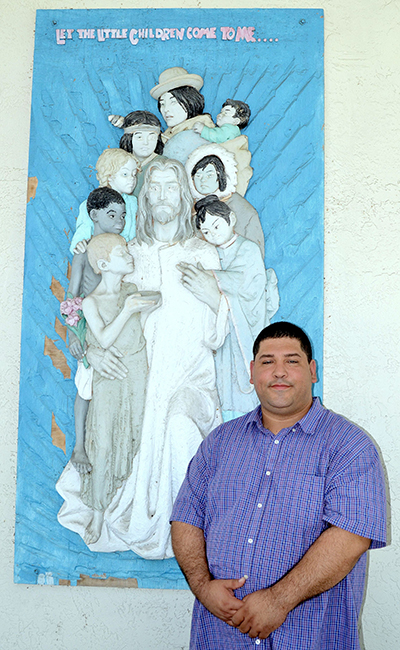
Photographer: JIM DAVIS | FC
Pablo Cuadra, director of religious formation at the Schott Center, pauses before a bas-relief of Jesus with children. The artwork is at the entrance to St. Jude Chapel, on the grounds of the Schott Center.
The fun is part of a comprehensive program of arts and crafts, liturgy and worship at the center, said Pablo Cuadra, director of religious formation.
"Our mission is to care for the most vulnerable, and to proclaim the gospel through all our services," Cuadra said. "Jesus was always ministering to the disabled: the blind, the deaf, the paralyzed.
"And it takes on even more importance during the Year of Mercy that the Holy Father has proclaimed. We are to convey, in concrete ways, the mercy of God."
Cuadra trains catechists and develops teaching resources � pictures, symbols, skits, gestures � for the 225-plus clients who often can't learn in traditional ways.
Rosary for the blind
Everything at the center, founded in 1986, is designed to serve persons with a range of conditions like autism, cerebral
Also for those with sight impairment. A "blind rosary" in a garden has a statue of Mary inside a white metal fence, its top studded with blue beads standing for the decades.
A roomful of easels shows the continuing program to develop the clients' artistic skills. So do their artworks on the walls of the center, showing sunsets, flowers,
Schott Communities actually has three divisions. The spiritual component, which Cuadra runs, includes Sunday Mass at the on-campus Chapel of St. Jude: not only for the clients but for their friends and families.
The 150 families conduct their church like most parishes. The chapel hosted a first Communion June 16, then confirmation June 19. The chapel also holds a celebration and picnic every October in honor of St. Jude, their patron saint.
Saying Mass for St. Jude are priests from neighboring parishes: Father Jaime Acevedo, pastor of St. Mark in Southwest Ranches; Father Jeff McCormick, pastor of St. Maximilian Kolbe in Pembroke Pines; and Father Robert Cadrecha and Msgr. Roberto Garza of St. John Vianney College Seminary in Miami.
Cuadra said the disabled members are aware they make involuntary groans and other sounds, and it makes them self-conscious. "We provide an environment that is welcoming and non-threatening. We think of (the sounds) as their way of praising God."
Beauty in everyone
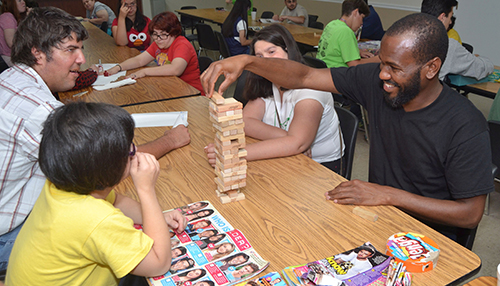
Photographer: JIM DAVIS | FC
Seminarian Dieutan Marseille plays a round of Jenga with Schott clients.
Serving with Cuadra are two seminarians. Dieutan Marseille, in his fourth year, smiles when asked what he gets out of the work. "It's a gift to see how God is good, and how the beauty of God is in every person."
Mathew Thomas agrees. A seminary graduate who is awaiting assignment to a parish for his pastoral year, he comes from Kerala, India, where the Dominican Missionaries for the Deaf and Disabled care for more than 250 mentally and physically handicapped.
"I want to start a community like that in this archdiocese," Thomas said. "Most people don’t show care and concern for the handicapped. (So) we have a chance to help."
Other groups contribute, too, including Best Buddies, St. Boniface Church in Pembroke Pines, Archbishop Edward A. McCarthy High School in Southwest Ranches, and Potential Church. The latter is a Southern Baptist megachurch just north of Schott.
The educational division includes the Adult Day Training program � complete with singing and dancing to a karaoke machine each week � plus arts and crafts. Some of the art is for sale, with proceeds going to the operation of the Schott Center.
The clients are encouraged to develop competency in several ways. One client, Frank Nicosia, not only serves as an usher at Mass; he even gave an original acrylic painting to Bishop Fernando Isern when the retired bishop of Pueblo, Colorado, originally a Miami priest, visited for confirmation.
Learning their language
Schott's staff develop much of their own curriculum, Cuadra said. Because many of the clients have developmental issues or even brain damage, the staffers must learn to convey concepts via symbols or gestures: steepled hands for "prayer," a picture of a flower for "life." Cuadra has created a chart of 18 rebus-like symbols spelling out the Easter story.
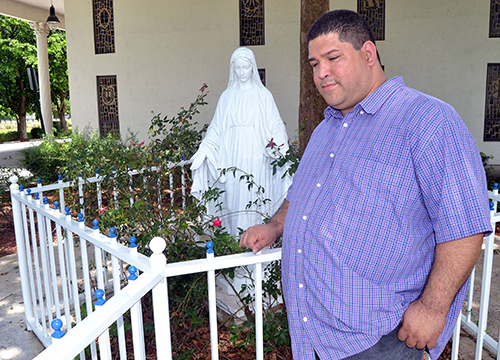
Photographer: JIM DAVIS | FC
Pablo Cuadra, director of religious formation at the Schott Center, shows an outdoor rosary designed for the blind. The blue beads correspond to the beads on a regular rosary.
"You have to learn their language, depending on the severity of their condition," he said. "They may not get the point of quizzes."
Action-oriented or "kinesthetic" skits can also help convey spiritual concepts, Cuadra said. A client may learn about Eucharist by pointing to bread and sharing something with thanks.
But do they really get the meaning of the Eucharist? Maybe not at other people’s level, Cuadra said, but "despite their limitations, they have a sense of it. In western society, we talk like God is something we 'get.' But he isn’t � he is someone we experience. We want to convey to the children that they are loved."
The third division of Schott Communities is assisted and group living. Eight residents with developmental disabilities live in a group
Cuadra himself has been with the Schott Communities for three years, after 22 years teaching and taking seminary studies. He was almost ordained twice, he said. "Then I decided I wanted to get married, and that I could also serve God as a layman."
He taught at Msgr. Edward Pace in Miami Gardens and Pope John Paul II High School in Boca Raton, as well as the public school system, before coming to Schott. It was a big change, yet a natural one, he said.
"When I create resources, I pray that the kids will be able to get something out of it," he said. "That’s very rewarding. This is a very special place."
This is part of a package of stories on Church outreach to the disabled that appeared in the July 2016 edition of the Florida Catholic. See related stories:

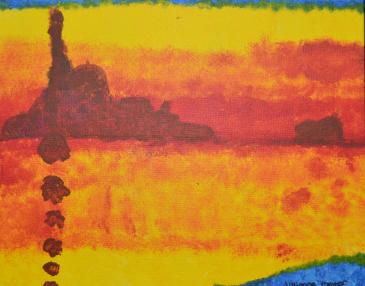
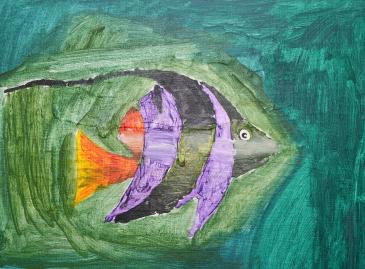
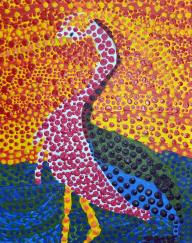
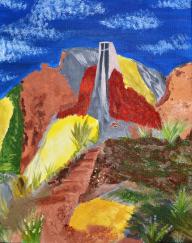
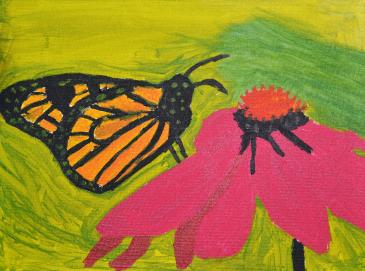
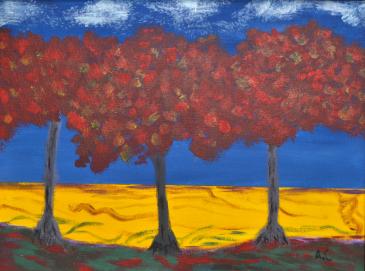
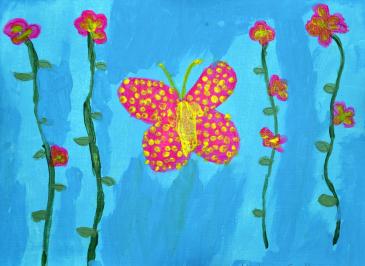
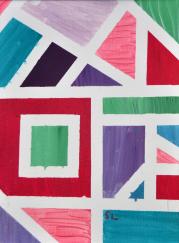


Comments from readers